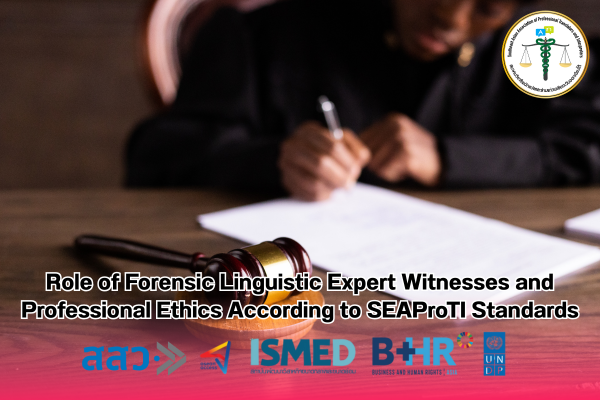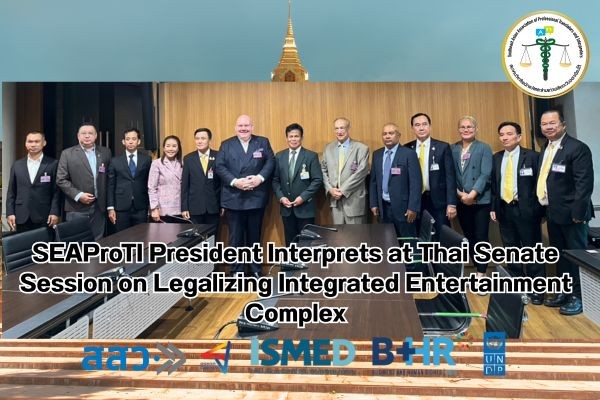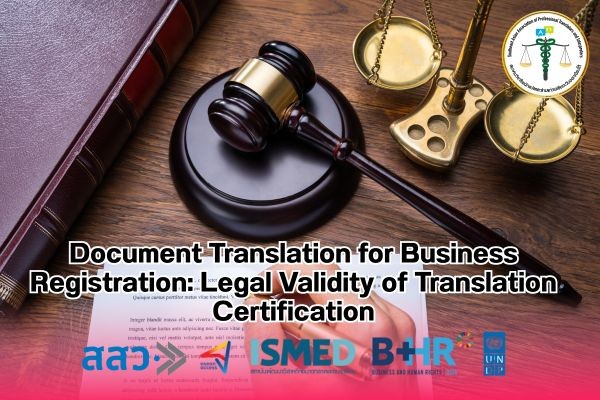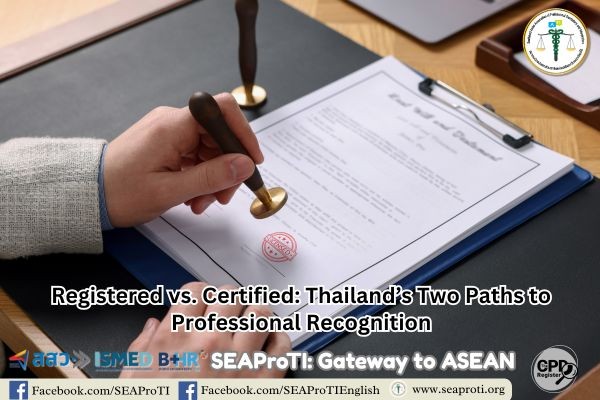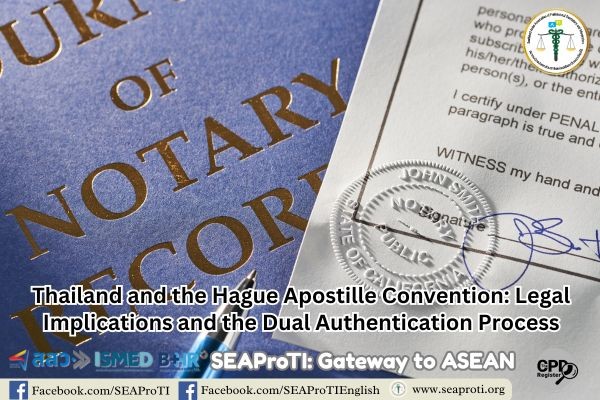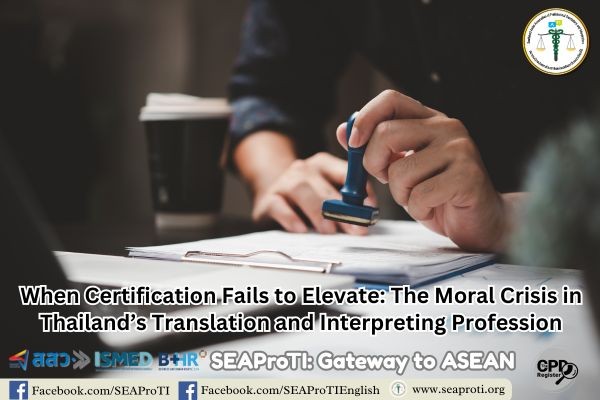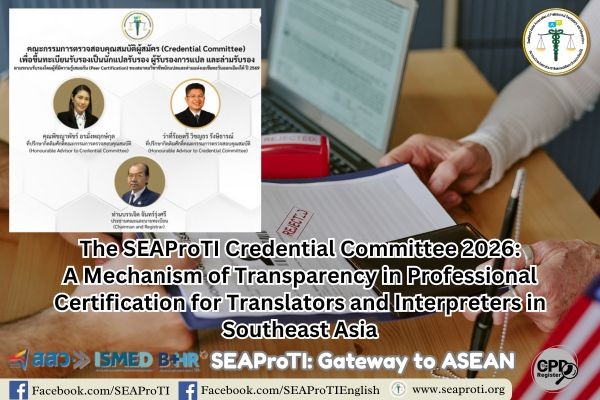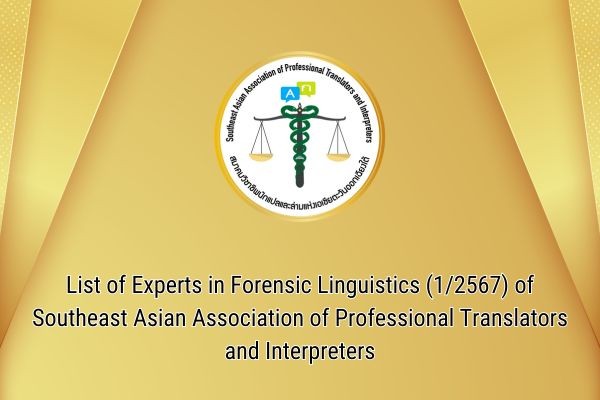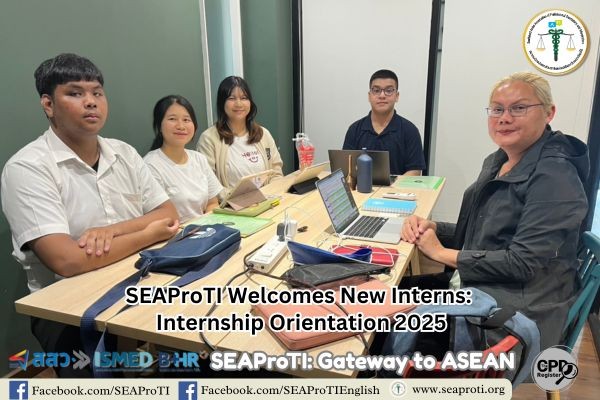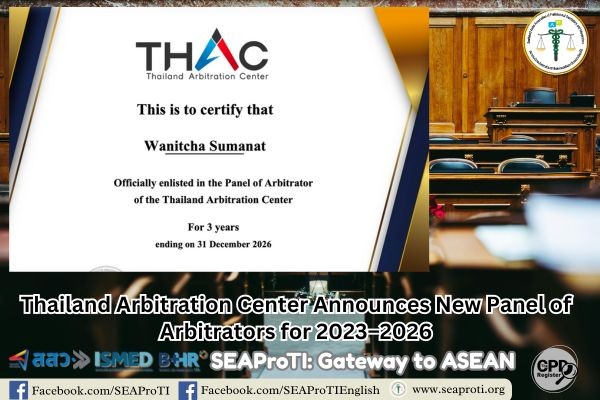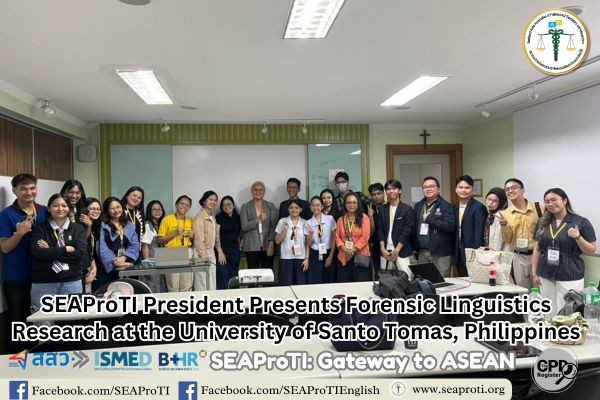The Role of Forensic Linguistic Expert Witnesses and Professional Ethics According to SEAProTI Standards
21 July 2025, Bangkok – This article outlines the conceptual framework and role of forensic linguistic expert witnesses within the Thai justice system. In particular, it emphasizes their function as academic consultants to the court in cases involving language-related evidence. The article also discusses the code of ethics and professional standards developed by the Southeast Asian Association of Professional Translators and Interpreters (SEAProTI), which plays a vital role in formalizing and promoting this profession. Furthermore, a case study is presented of the first officially recognized forensic linguistic expert in Thailand within state-level justice institutions.
1. Introduction
Forensic linguistics is a subfield of applied linguistics that investigates the use of language in legal and judicial contexts, such as analyzing wording in testimonies, evaluating legal translations, or identifying authorship of disputed texts.¹ The integration of linguistic experts into judicial proceedings as expert witnesses is of critical importance, particularly in cases where disputes arise from ambiguous, misleading, or legally significant language.
2. The Role of the Forensic Linguistic Expert
A forensic linguistic expert performs the role of analyzing and providing academic opinions on language evidence. However, they do not determine guilt or innocence, as that is solely the responsibility of the court.² Their key roles include:
- Analyzing words, statements, or linguistic usage in evidence;
- Assessing the quality of translations and the consequences of mistranslation;
- Interpreting implied meanings, ambiguity, or intentional language manipulation;
- Attributing authorship based on linguistic style (authorship attribution);
Offering linguistic testimony based on empirical evidence and scholarly theories.
3. Ethics and Professional Standards as Defined by SEAProTI
SEAProTI has established a clear ethical framework and professional standards for forensic linguistic experts, aligned with academic norms and international codes of conduct:
3.1 Impartiality
Experts must avoid conflicts of interest and refrain from favoring any party.
3.2 Academic Integrity
They must report truthfully, refrain from manipulating findings, and disclose limitations transparently.
3.3 Evidence-Based Practice
Expert opinions must be grounded in verifiable data and accepted linguistic theory.
3.4 Professional Competence
Experts must hold relevant academic qualifications and be certified by a recognized professional body, such as SEAProTI.
3.5 Confidentiality
Information encountered in the course of their duties must be kept confidential unless ordered by the court.
4. Case Study: Thailand’s First Recognized Forensic Linguistic Expert
A pioneering figure in this field is Khun Wanitcha Sumanat, President of SEAProTI, who actively serves both as a certified translator and interpreter (Level 3) and a forensic linguistics expert across institutional platforms. Her appointments include:
- Mediator at the Rights and Liberties Protection Department, Ministry of Justice;
- Mediator at the Judge Advocate General’s Department, Ministry of Defence;
- Mediator at the Royal Thai Police;
Dispute resolution specialist and arbitrator at the Thailand Arbitration Center (THAC), Ministry of Justice.
Khun Wanitcha is the first officially recognized forensic linguistic expert in Thailand, working under SEAProTI’s mandate. She provides comprehensive services to both governmental and private sectors, offering linguistic expertise in translation disputes, authorship investigations, and legal language interpretation. Her contributions exemplify the successful integration of linguistics into the legal profession.
5. Conclusion
Forensic linguistic experts play a crucial role in ensuring justice, especially in cases involving complex or ambiguous language. SEAProTI, as a leading professional organization, has developed ethical standards and professional protocols consistent with global practice. The case of Khun Wanitcha Sumanat demonstrates the growing recognition of linguistic expertise in Thailand’s legal system and the expanding potential of this emerging profession.
Footnotes
- Olsson, J. (2008). Forensic linguistics: An introduction to language, crime and the law. London: Continuum.
- Coulthard, M., & Johnson, A. (2007). An Introduction to Forensic Linguistics: Language in Evidence. Routledge.
- SEAProTI. (2024). Ethical Code of Conduct and Professional Standards. Southeast Asian Association of Professional Translators and Interpreters.
- Shuy, R. (2006). Linguistics in the courtroom: A practical guide. Oxford University Press.
- Gibbons, J. (2003). Forensic Linguistics: An Introduction to Language in the Justice System. Blackwell Publishing.
SEAProTI’s certified translators, translation certification providers, and certified interpreters:
The Southeast Asian Association of Professional Translators and Interpreters (SEAProTI) has officially announced the criteria and qualifications for individuals to register as “Certified Translators,” “Translation Certification Providers,” and “Certified Interpreters” under the association’s regulations. These guidelines are detailed in Sections 9 and 10 of the Royal Thai Government Gazette, issued by the Secretariat of the Cabinet under the Office of the Prime Minister of the Kingdom of Thailand, dated July 25, 2024, Volume 141, Part 66 Ng, Page 100. the Royal Thai Government Gazette
บทบาทของพยานผู้เชี่ยวชาญด้านนิติภาษาศาสตร์และมาตรฐานจรรยาบรรณตามแนวทางของ SEAProTI
21 กรกฎาคม 2568, กรุงเทพมหานคร – บทความนี้นำเสนอกรอบแนวคิดและบทบาทของพยานผู้เชี่ยวชาญด้านนิติภาษาศาสตร์ (Expert Witness in Forensic Linguistics) ในบริบทกระบวนการยุติธรรมของประเทศไทย โดยเฉพาะในฐานะที่ปรึกษาทางวิชาการแก่ศาลเกี่ยวกับหลักฐานที่เกี่ยวข้องกับภาษา พร้อมทั้งอธิบายหลักจรรยาบรรณและมาตรฐานวิชาชีพของสมาคมวิชาชีพนักแปลและล่ามแห่งเอเชียตะวันออกเฉียงใต้ (SEAProTI) ซึ่งเป็นองค์กรวิชาชีพที่มีบทบาทสำคัญในการผลักดันการพัฒนาวิชาชีพนี้อย่างเป็นระบบ ทั้งนี้ยังเสนอกรณีศึกษาเชิงประจักษ์ของผู้เชี่ยวชาญด้านนิติภาษาศาสตร์คนแรกของประเทศไทยที่ได้รับการยอมรับอย่างเป็นทางการในระดับสถาบันยุติธรรมของรัฐ
1. บทนำ
นิติภาษาศาสตร์ (Forensic Linguistics) เป็นสาขาหนึ่งของภาษาศาสตร์ประยุกต์ที่ศึกษาการใช้ภาษาในบริบทของกฎหมายและกระบวนการยุติธรรม เช่น การวิเคราะห์ถ้อยคำในคำให้การ การประเมินคุณภาพของการแปลทางกฎหมาย หรือการตรวจสอบตัวตนผู้เขียนข้อความ1 การนำผู้เชี่ยวชาญด้านภาษาศาสตร์เข้าสู่กระบวนการยุติธรรมในฐานะ “พยานผู้เชี่ยวชาญ” (Expert Witness) จึงมีความสำคัญอย่างยิ่ง โดยเฉพาะในคดีที่ข้อพิพาทมีรากฐานจากการใช้ภาษาที่คลุมเครือ ผิดความหมาย หรือมีผลกระทบทางกฎหมาย
2. บทบาทของผู้เชี่ยวชาญด้านนิติภาษาศาสตร์
ผู้เชี่ยวชาญด้านนิติภาษาศาสตร์ทำหน้าที่วิเคราะห์และให้ความเห็นทางวิชาการเกี่ยวกับภาษาในหลักฐาน โดยไม่ชี้ว่าฝ่ายใด “ผิด” หรือ “ถูก” อำนาจดังกล่าวเป็นของศาลเท่านั้น2 บทบาทหลักของผู้เชี่ยวชาญประกอบด้วย:
- วิเคราะห์ถ้อยคำ ข้อความ หรือการใช้ภาษาในหลักฐาน
- ตรวจสอบคุณภาพของการแปลและผลกระทบจากการตีความผิด
- ประเมินความหมายโดยนัย การใช้ถ้อยคำกำกวม หรือเจตนาทางภาษา
- พิสูจน์ตัวบุคคลจากรูปแบบการใช้ภาษา (authorship attribution)
- ให้คำอธิบายต่อศาลโดยยึดหลักวิชาการและข้อมูลเชิงประจักษ์
3. จรรยาบรรณและแนวทางวิชาชีพตามมาตรฐานของ SEAProTI
สมาคมวิชาชีพนักแปลและล่ามแห่งเอเชียตะวันออกเฉียงใต้ (SEAProTI) ได้วางแนวทางวิชาชีพและจรรยาบรรณของผู้เชี่ยวชาญด้านนิติภาษาศาสตร์โดยอิงหลักวิชาการและจริยธรรมสากล ดังนี้:
3.1 ความเป็นกลาง (Impartiality)
ต้องไม่รับงานที่มีผลประโยชน์ทับซ้อน และไม่แสดงท่าทีเอนเอียงต่อฝ่ายใดฝ่ายหนึ่ง
3.2 ความซื่อสัตย์ทางวิชาการ (Academic Integrity)
ต้องอ้างอิงข้อมูลตามความจริง ไม่บิดเบือนหลักฐาน และเปิดเผยข้อจำกัดของการวิเคราะห์
3.3 การอิงหลักฐาน (Evidence-based Practice)
การให้ความเห็นต้องตั้งอยู่บนพื้นฐานของข้อมูลที่ตรวจสอบได้ และใช้ทฤษฎีทางภาษาศาสตร์ที่เป็นที่ยอมรับ
3.4 คุณสมบัติและความเชี่ยวชาญ (Professional Competence)
ต้องมีวุฒิการศึกษาในสาขาที่เกี่ยวข้อง และได้รับการรับรองจากองค์กรวิชาชีพ เช่น SEAProTI
3.5 การรักษาความลับ (Confidentiality)
ข้อมูลที่ได้รับในระหว่างการปฏิบัติงานต้องได้รับการเก็บรักษาอย่างเป็นความลับตามหลักจริยธรรมและกฎหมาย
4. กรณีศึกษา: ผู้เชี่ยวชาญด้านนิติภาษาศาสตร์คนแรกของประเทศไทย
หนึ่งในบุคคลที่มีบทบาทสำคัญในการบุกเบิกสาขานี้ในประเทศไทยคือ คุณวณิชชา สุมานัส นายกสมาคม SEAProTI ผู้ซึ่งปฏิบัติหน้าที่ทั้งในฐานะนักแปลและล่ามรับรองระดับ 3 และเป็นผู้เชี่ยวชาญด้านนิติภาษาศาสตร์ในระดับสถาบัน โดยมีตำแหน่งหน้าที่ที่ได้รับแต่งตั้งจากหลายหน่วยงานของรัฐ ได้แก่:
- ผู้ไกล่เกลี่ยของกรมคุ้มครองสิทธิและเสรีภาพ กระทรวงยุติธรรม
- ผู้ไกล่เกลี่ยของกรมพระธรรมนูญ กระทรวงกลาโหม
- ผู้ไกล่เกลี่ยของสำนักงานตำรวจแห่งชาติ
- ผู้ประนอมข้อพิพาทและอนุญาโตตุลาการของสถาบันอนุญาโตตุลาการ (THAC) กระทรวงยุติธรรม
คุณวณิชชาฯ ยังดำรงตำแหน่งผู้เชี่ยวชาญด้านนิติภาษาศาสตร์ในนามของ SEAProTI คนแรกของประเทศไทยที่ศาสตร์ด้านนิติภาษาศาสตร์ (Forensic Linguistics) แบบครบวงจร โดยให้บริการทั้งแก่หน่วยงานรัฐและเอกชน เป็นผู้ให้คำปรึกษาทางวิชาการในคดีข้อพิพาทที่เกี่ยวข้องกับภาษาและการแปล และถือเป็นต้นแบบของการบูรณาการภาษาศาสตร์เข้ากับกฎหมายในระดับวิชาชีพ
5. บทสรุป
ผู้เชี่ยวชาญด้านนิติภาษาศาสตร์มีบทบาทสำคัญในกระบวนการยุติธรรม โดยช่วยให้ศาลเข้าใจเนื้อหาทางภาษาที่อาจคลุมเครือหรือถูกใช้เพื่อจุดประสงค์เฉพาะอย่างแม่นยำยิ่งขึ้น SEAProTI ในฐานะองค์กรวิชาชีพ ได้พัฒนากรอบจรรยาบรรณและมาตรฐานการปฏิบัติงานที่สอดคล้องกับแนวปฏิบัติสากล เพื่อส่งเสริมการยอมรับวิชาชีพนี้อย่างกว้างขวางในประเทศไทย ตัวอย่างของคุณวณิชชา สุมานัส เป็นหลักฐานของความเป็นไปได้ในการสร้างพื้นที่ให้กับผู้เชี่ยวชาญด้านภาษาศาสตร์ในเวทีของกฎหมายและการยุติธรรม
เชิงอรรถ
- Olsson, J. (2008). Forensic linguistics: An introduction to language, crime and the law. London: Continuum.
- Coulthard, M., & Johnson, A. (2007). An Introduction to Forensic Linguistics: Language in Evidence. Routledge.
- SEAProTI. (2024). Ethical Code of Conduct and Professional Standards. สมาคมวิชาชีพนักแปลและล่ามแห่งเอเชียตะวันออกเฉียงใต้.
- Shuy, R. (2006). Linguistics in the courtroom: A practical guide. Oxford University Press.
- Gibbons, J. (2003). Forensic Linguistics: An Introduction to Language in the Justice System. Blackwell Publishing.
เกี่ยวกับนักแปลรับรอง ผู้รับรองการแปล และล่ามรับรองของสมาคมวิชาชีพนักแปลและล่ามแห่งเอเชียตะวันออกเฉียงใต้
สมาคมวิชาชีพนักแปลและล่ามแห่งเอเชียตะวันออกเฉียงใต้ (SEAProTI) ได้ประกาศหลักเกณฑ์และคุณสมบัติผู้ที่ขึ้นทะเบียนเป็น “นักแปลรับรอง (Certified Translators) และผู้รับรองการแปล (Translation Certification Providers) และล่ามรับรอง (Certified Interpreters)” ของสมาคม หมวดที่ 9 และหมวดที่ 10 ในราชกิจจานุเบกษา ของสำนักเลขาธิการคณะรัฐมนตรี ในสำนักนายกรัฐมนตรี แห่งราชอาณาจักรไทย ลงวันที่ 25 ก.ค. 2567 เล่มที่ 141 ตอนที่ 66 ง หน้า 100 อ่านฉบับเต็มได้ที่: นักแปลรับรอง ผู้รับรองการแปล และล่ามรับรอง


